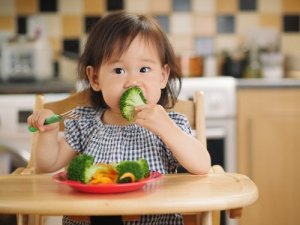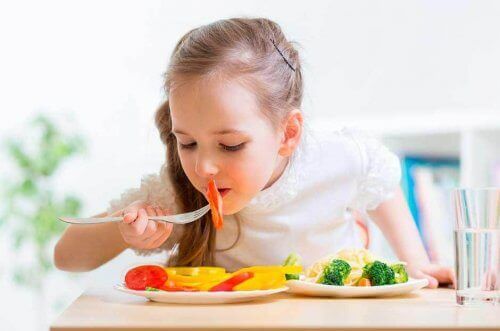Soft Diet for Children with Stomach Problems

A soft diet for children with stomach problems is a temporary solution when their body needs to heal. Although it sometimes isn’t easy to identify the most suitable foods, in this article, we’ll talk about those that should be included in a soft diet for children with stomach problems.
A soft diet involves choosing foods that are soft and easy to chew and digest. This type of diet aims to facilitate the body’s digestion process. It shouldn’t be followed in the long term, as it doesn’t fulfill dietary requirements and can cause malnutrition.
In fact, a soft diet is one of the few that urge children to eat foods low in fiber and processed carbohydrates. Although it may seem restrictive at the beginning, there are many different options to consider.
Also, you should know that stomach problems can include vomiting, diarrhea, and stomach pain, which can cause children a lot of discomfort. Repeated episodes of vomiting or diarrhea can lead to dehydration. In most cases, you have to wait until the discomfort disappears. However, certain foods can help relieve stomach pain and discomfort.
In addition to talking about the foods you should keep in mind, we’ll also mention the ones that you should avoid. For example, avoid giving your children fatty foods, as they can irritate their stomach and worsen the problems that can sometimes be accompanied by vomiting or diarrhea. You should also avoid dairy products, chocolate, and soft drinks.
Soft diet for children with stomach problems
You can include many foods in a soft diet. Below, we’ll tell you everything you need to know about a soft diet for children with stomach problems. Take note!

1. Avoid foods rich in fiber and fat
A soft diet consists of including foods low in fiber and fat. Foods that are low in fiber and fat are easier for children’s bodies to digest. Both fiber-rich foods and fat-rich foods can harm the stomach.
Both food groups favor the intestinal tract, which is why you should exclude them from a soft diet for children with stomach problems.
2. Include vegetables and fruits
If your child has stomach problems, you should include fresh produce such as fruits and vegetables in his or her diet, as well as try to include soft protein sources, such as cooked eggs and fish.
Apples, plantains, and papaya are some of the healthiest fruits and vegetables for children with stomach problems. Don’t forget that you should exclude fiber-rich legumes and vegetables from their diet.
3. Cut out processed foods
Third of all, you should know that you should cut out processed foods (all packaged and fast foods) from your children’s diet if they have digestive problems.
These foods tend to contain many harmful substances, such as trans fats and preservatives, which can affect digestion. Due to the fact that many of these substances aren’t natural, they can considerably complicate digestion.
4. Your child should drink plenty of water
Finally, don’t forget that your child should drink plenty of water when following a soft diet. This will prevent dehydration, which could slow the body’s healing process.
In addition, it will favor digestion, even though your child’s body isn’t getting a lot of fiber. Undoubtedly, staying well hydrated is good for your child’s overall health and can help fight stomach problems.

As you’ve seen, stomach problems, such as diarrhea, bloating, gas, constipation, and even inflammatory bowel disease, may be caused by many factors. However, the underlying cause is usually inappropriate eating habits, which is why a soft diet is a temporary way to give your child’s digestive system a break.
Finally, we recommend that, if you follow these recommendations and notice that your child’s discomfort doesn’t disappear or worsens, you should take him or her to the doctor immediately.
A soft diet for children with stomach problems is a temporary solution when their body needs to heal. Although it sometimes isn’t easy to identify the most suitable foods, in this article, we’ll talk about those that should be included in a soft diet for children with stomach problems.
A soft diet involves choosing foods that are soft and easy to chew and digest. This type of diet aims to facilitate the body’s digestion process. It shouldn’t be followed in the long term, as it doesn’t fulfill dietary requirements and can cause malnutrition.
In fact, a soft diet is one of the few that urge children to eat foods low in fiber and processed carbohydrates. Although it may seem restrictive at the beginning, there are many different options to consider.
Also, you should know that stomach problems can include vomiting, diarrhea, and stomach pain, which can cause children a lot of discomfort. Repeated episodes of vomiting or diarrhea can lead to dehydration. In most cases, you have to wait until the discomfort disappears. However, certain foods can help relieve stomach pain and discomfort.
In addition to talking about the foods you should keep in mind, we’ll also mention the ones that you should avoid. For example, avoid giving your children fatty foods, as they can irritate their stomach and worsen the problems that can sometimes be accompanied by vomiting or diarrhea. You should also avoid dairy products, chocolate, and soft drinks.
Soft diet for children with stomach problems
You can include many foods in a soft diet. Below, we’ll tell you everything you need to know about a soft diet for children with stomach problems. Take note!

1. Avoid foods rich in fiber and fat
A soft diet consists of including foods low in fiber and fat. Foods that are low in fiber and fat are easier for children’s bodies to digest. Both fiber-rich foods and fat-rich foods can harm the stomach.
Both food groups favor the intestinal tract, which is why you should exclude them from a soft diet for children with stomach problems.
2. Include vegetables and fruits
If your child has stomach problems, you should include fresh produce such as fruits and vegetables in his or her diet, as well as try to include soft protein sources, such as cooked eggs and fish.
Apples, plantains, and papaya are some of the healthiest fruits and vegetables for children with stomach problems. Don’t forget that you should exclude fiber-rich legumes and vegetables from their diet.
3. Cut out processed foods
Third of all, you should know that you should cut out processed foods (all packaged and fast foods) from your children’s diet if they have digestive problems.
These foods tend to contain many harmful substances, such as trans fats and preservatives, which can affect digestion. Due to the fact that many of these substances aren’t natural, they can considerably complicate digestion.
4. Your child should drink plenty of water
Finally, don’t forget that your child should drink plenty of water when following a soft diet. This will prevent dehydration, which could slow the body’s healing process.
In addition, it will favor digestion, even though your child’s body isn’t getting a lot of fiber. Undoubtedly, staying well hydrated is good for your child’s overall health and can help fight stomach problems.

As you’ve seen, stomach problems, such as diarrhea, bloating, gas, constipation, and even inflammatory bowel disease, may be caused by many factors. However, the underlying cause is usually inappropriate eating habits, which is why a soft diet is a temporary way to give your child’s digestive system a break.
Finally, we recommend that, if you follow these recommendations and notice that your child’s discomfort doesn’t disappear or worsens, you should take him or her to the doctor immediately.
All cited sources were thoroughly reviewed by our team to ensure their quality, reliability, currency, and validity. The bibliography of this article was considered reliable and of academic or scientific accuracy.
- Gopirajah R., Prakash Raischurkar K., Wadhwa R., Anandharamakrishnan C., The gycemic response to fibre rich foods and their relationaship with gastric emptying and motor functions: an MRI study. Food Funct, 2016. 7 (9): 3964-72.
- Valenzuela CA., Baker EJ., Miles EA., Calder PC., Eighteen carbón trans fatty acids and inflammation in the context of atherosclerosis. Prog Lipid Res, 2019.
This text is provided for informational purposes only and does not replace consultation with a professional. If in doubt, consult your specialist.








